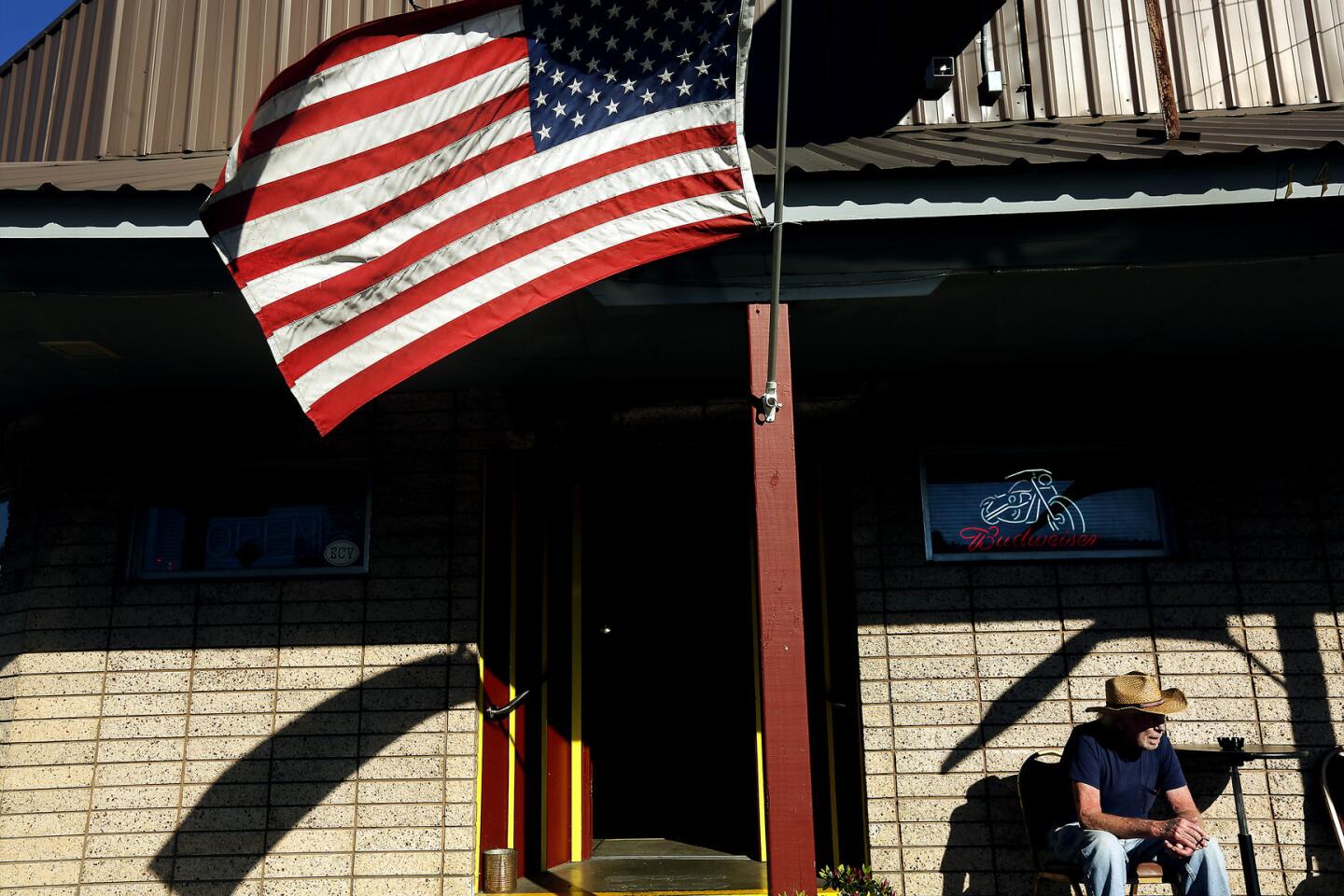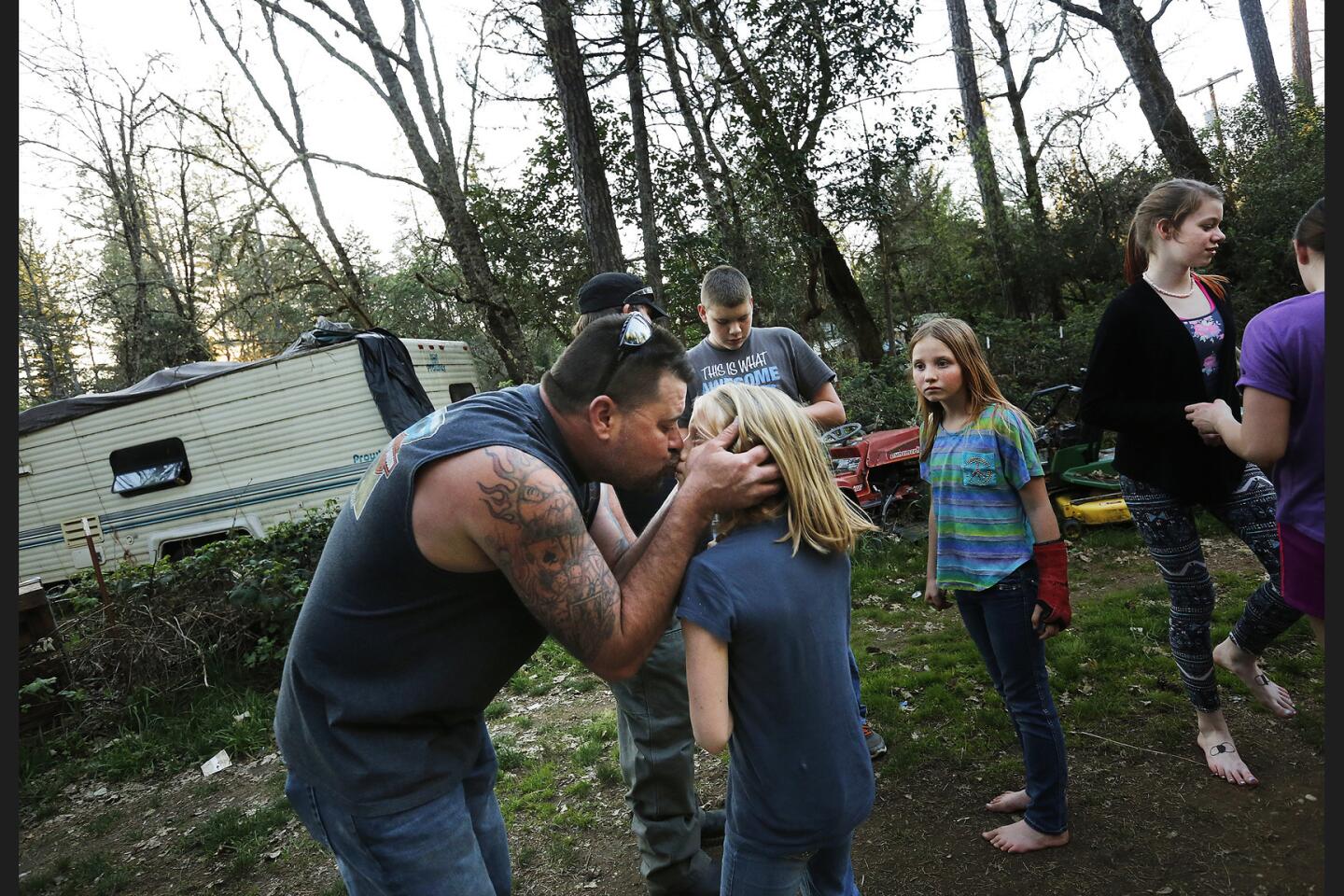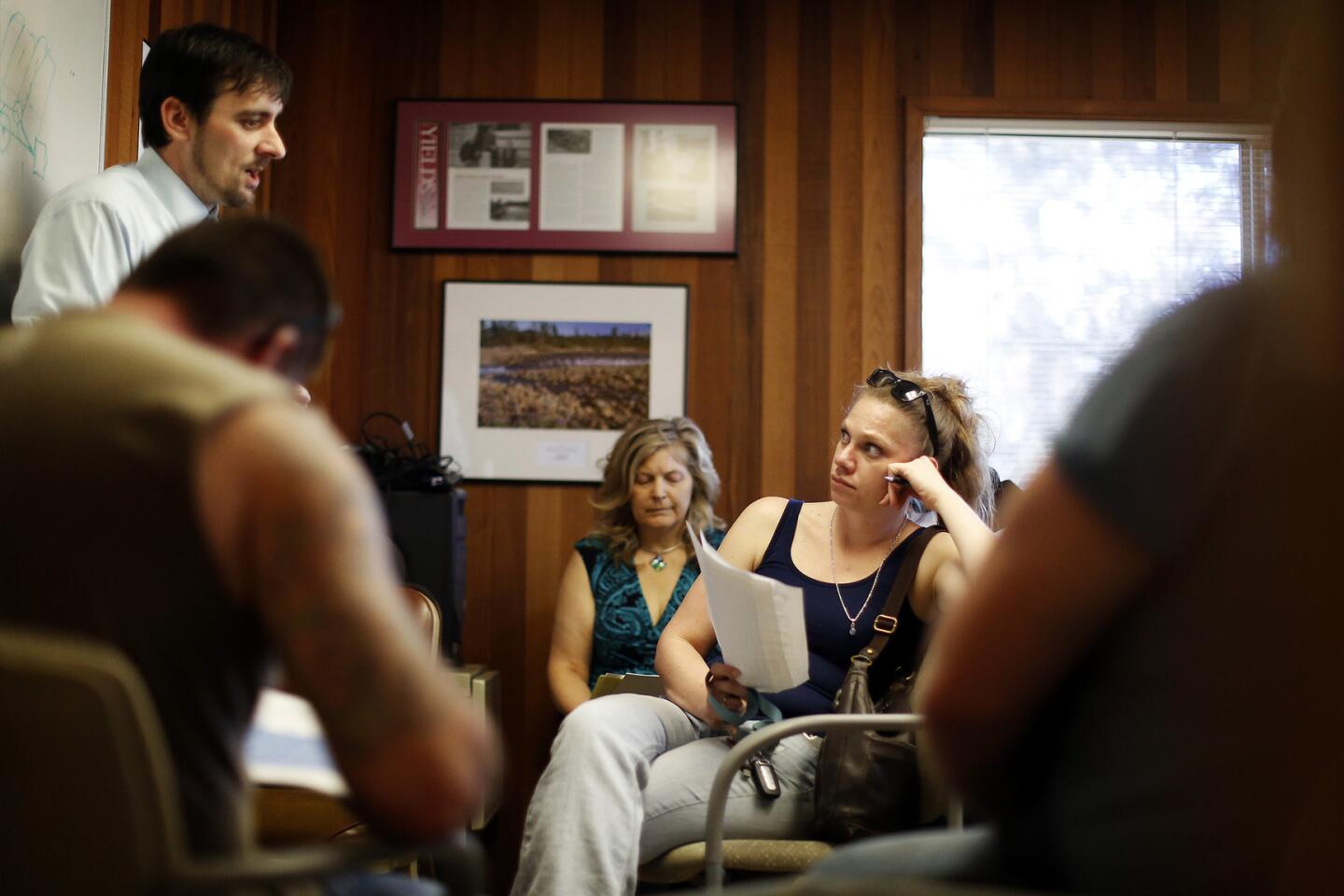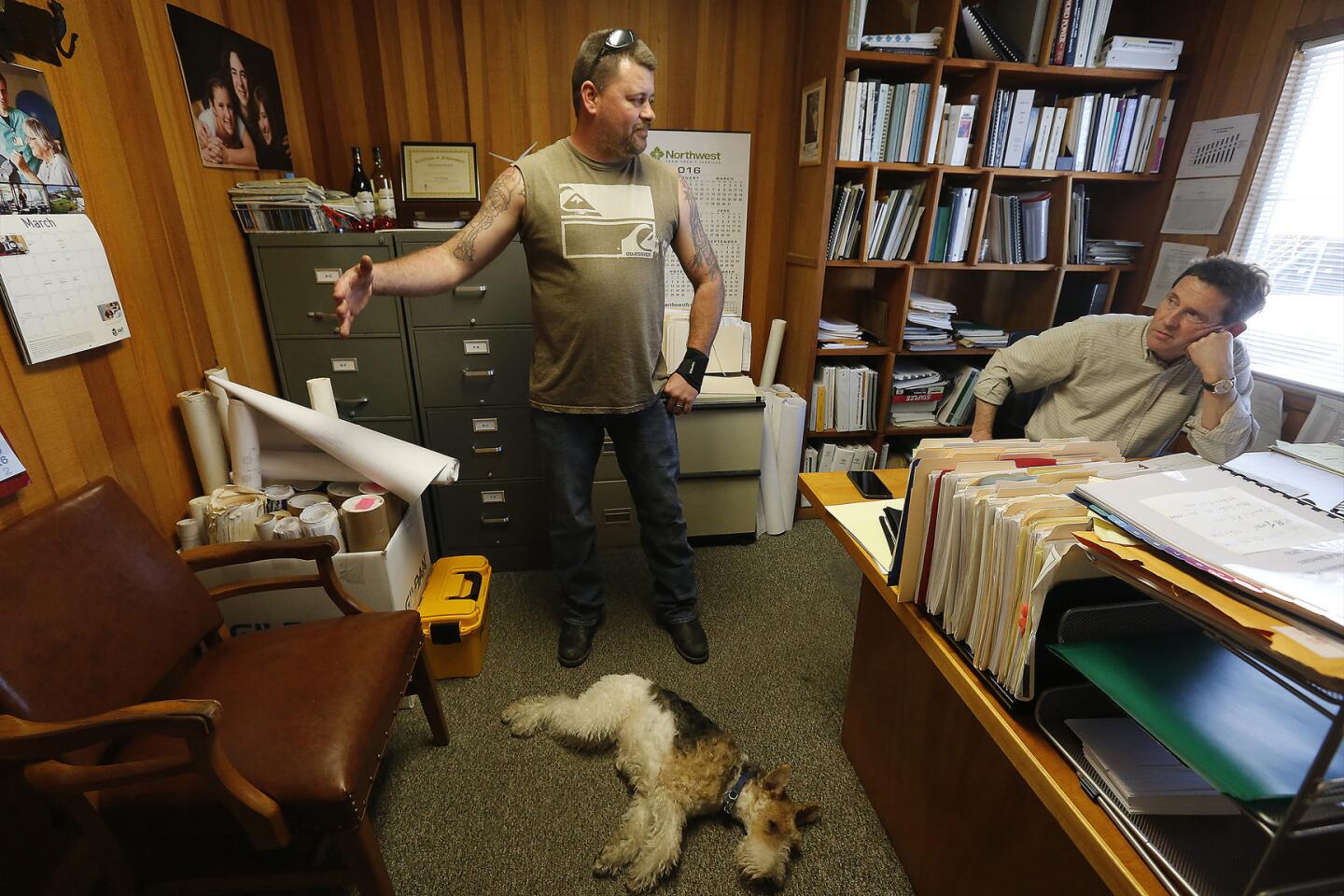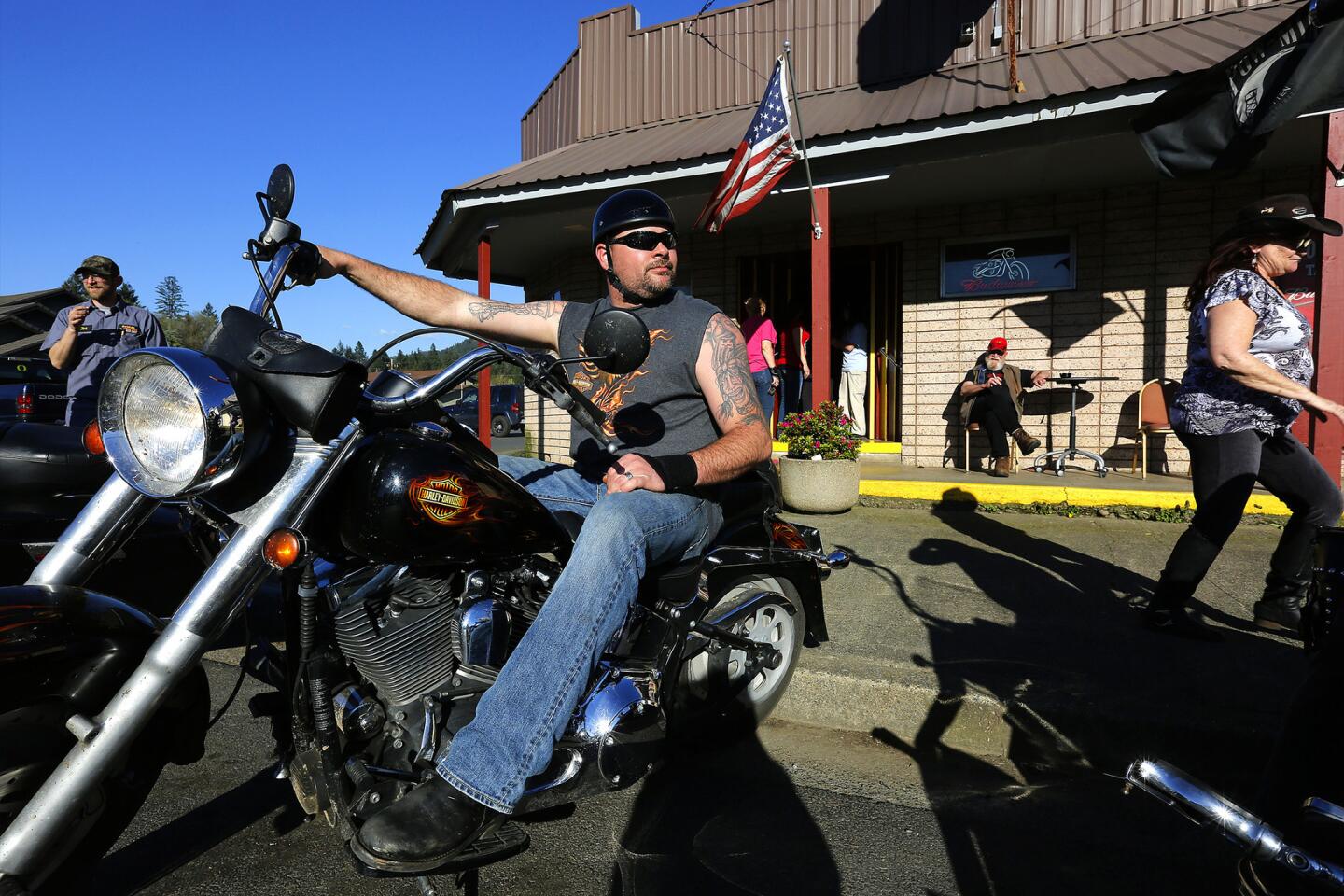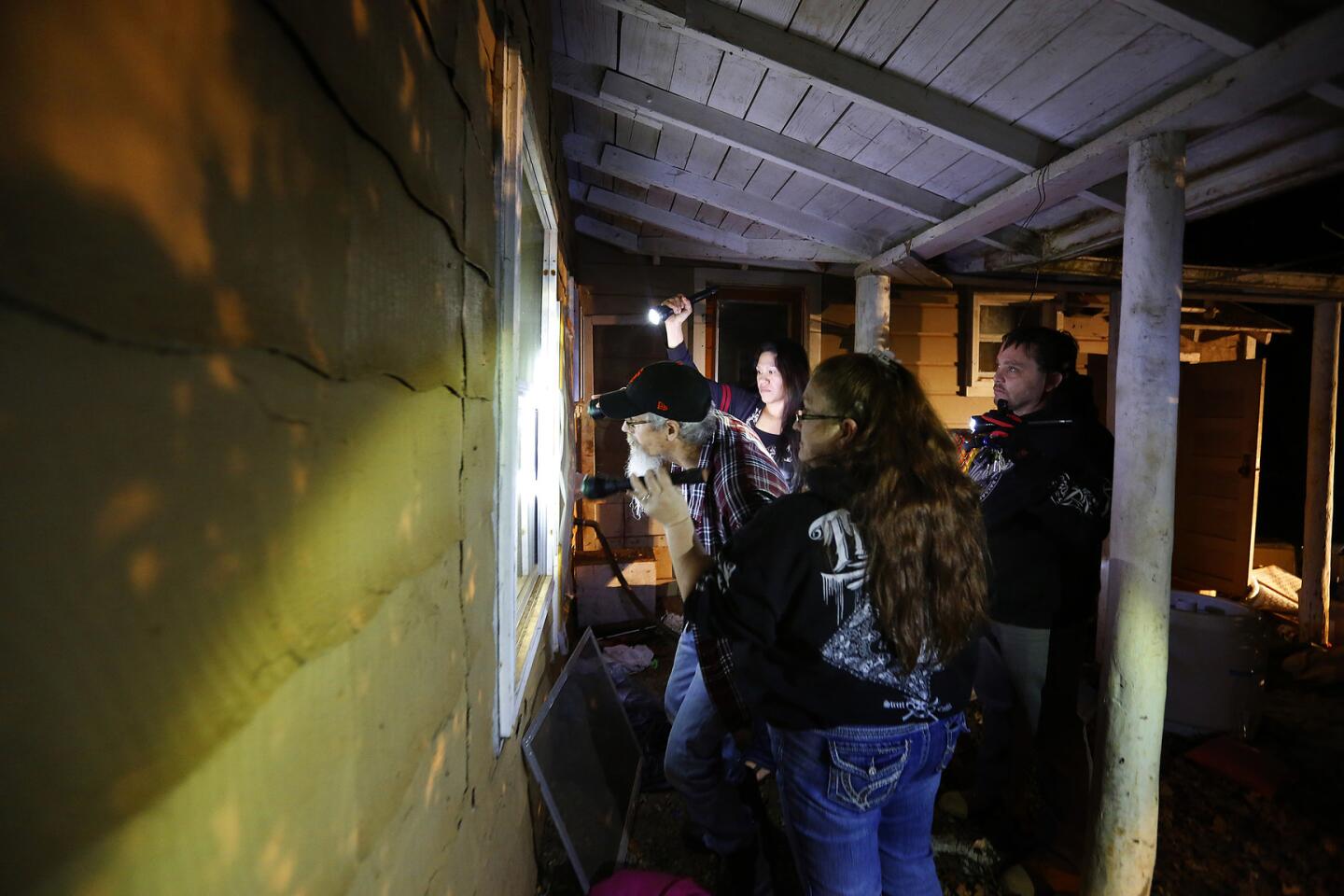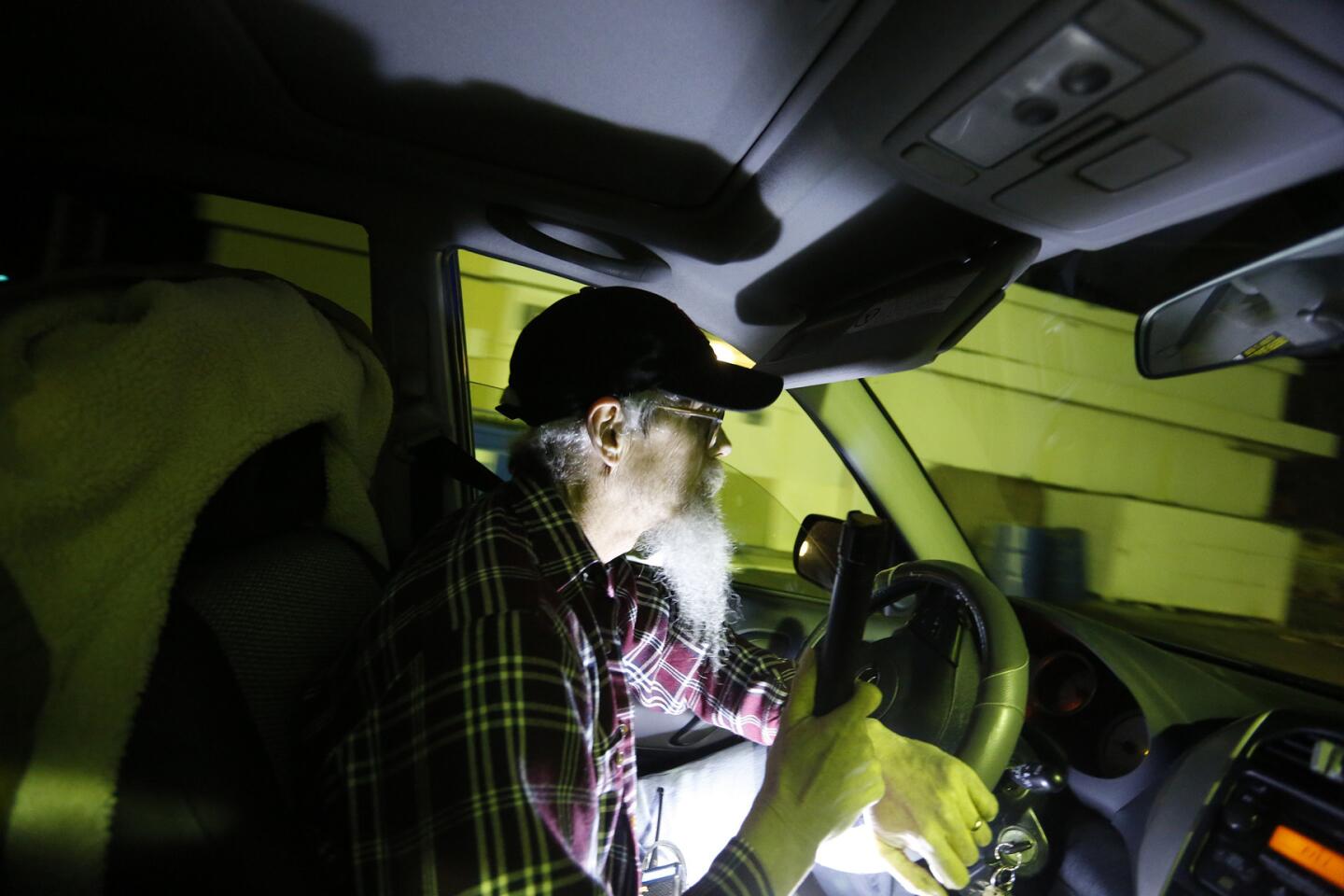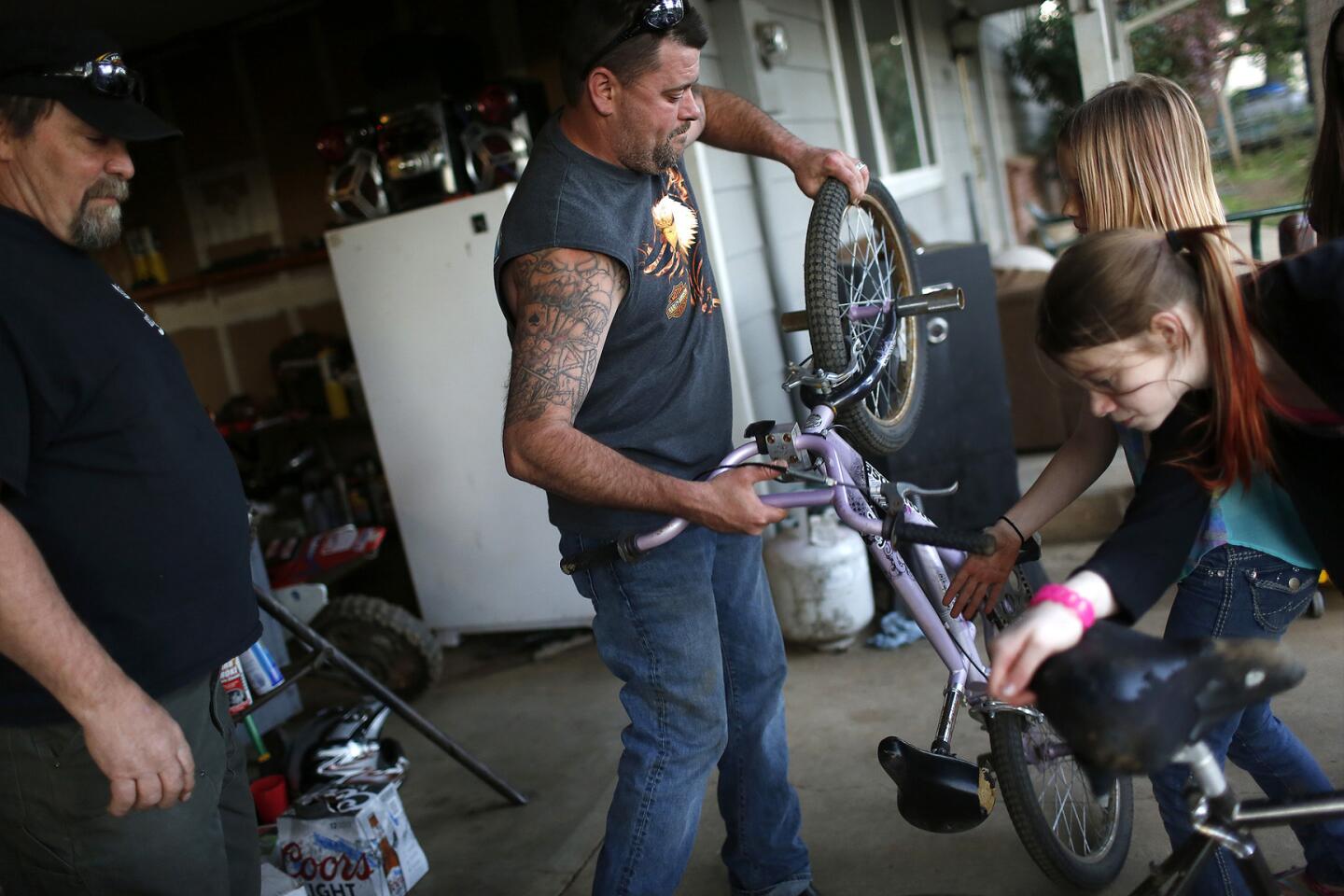Inside Trump Nation: In a down-on-its-luck Oregon mill town, the savior theyâre waiting for is Donald Trump
Reporting from Cave Junction, Ore. â He used to wake her up nights, shouting out his terror in the dark, his tattooed biceps continuing their clench-and-spasm dance long after a shift feeding cedar logs into the endless maw of the lumber mill.
In his nightmare, Keven Jones pushed the logs into neat rows, but as he dreamed, the logs started to tumble. They swung down, log after rolling log, bouncing off his rib cage, burying him. He would wake, eyes wide, mouth agape. Only seconds later did he hear himself screaming.
Carol was used to her husbandâs unconscious thrashing. The nightmares were once the price he paid for a good job. But the Rough & Ready mill that employed Jones all of his adult life closed in early February, and now what Carol Jones often wakes to in the middle of the night is her husband sitting alone in the living room with a bottle of Jack Danielâs.
âHeâs all wired up, nothing to do with that energy,â she says. Before, when he was working, âheâd pull extra shifts and come home tired, really tired. Now heâs got just time.â
Keven Jones, 36, blames a band saw for the two fingers he lost years ago on his right hand. For the quiet panic heâs in now, for the over-regulating that heâs convinced shut down the mill and threw 63 people out of work, that, he figures, was the governmentâs fault.
âWe have what we need to stay in business right here,â Jones says, pointing to the lush pine and cedar forests that surround this town of 1,800 people on the northwest slope of the Siskiyou mountain range. âBut we canât get out there to cut it down because one agency wonât talk to another one, or the environmentalists tie it up in court.â
When Jones thinks about what kind of president might be able to do something, he looks at the one who seems to him least like a politician: Donald Trump.
Oregonâs politics are dominated by the Democratic Party machine in Portland and Salem â the state hasnât elected a Republican to statewide office since 2002. But this mountainous corner of southwest Oregon, just up the Redwood Highway from the California border, has always leaned Republican.
And even as GOP voters across the state have waffled ahead of the May 17 primary, drifting from retired neurosurgeon Ben Carson to Texas Sen. Ted Cruz and Ohio Gov. John Kasich before leaning toward Trump, the New York real estate magnateâs support in Josephine County has never wavered.
------------
FOR THE RECORD
6:13 a.m.: An earlier version of this article stated that the Oregon primary is scheduled for May 19. It is is set for May 17.
------------
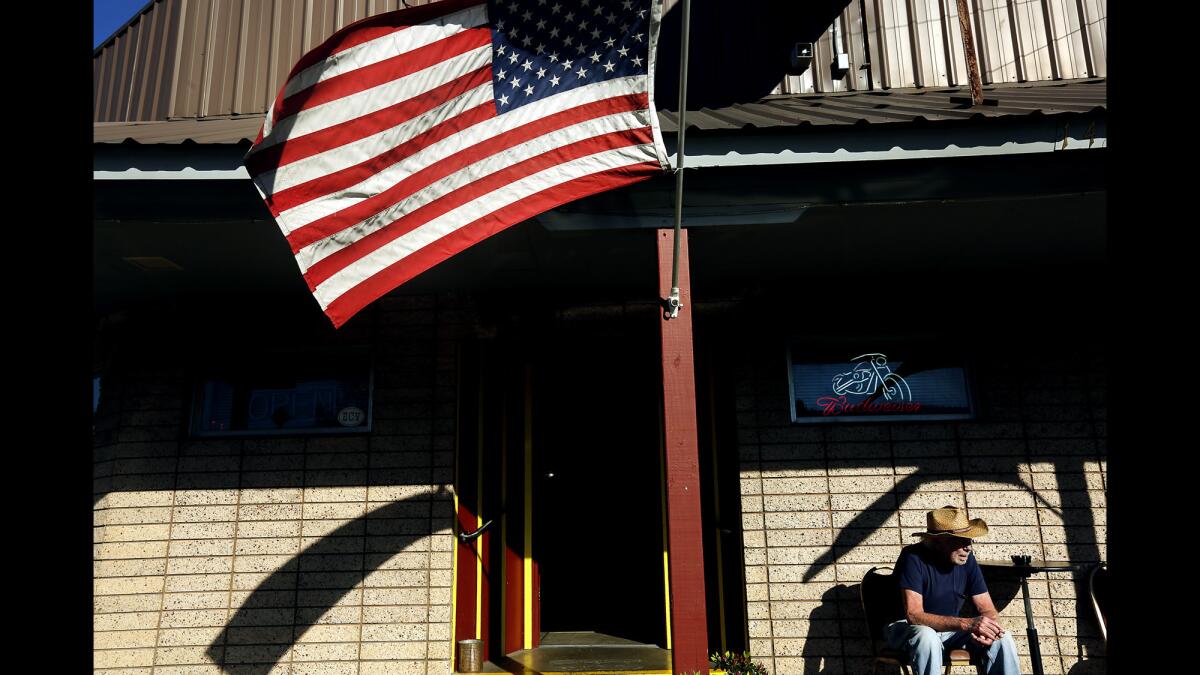
A regular smokes outside Sportsman Tavern in Cave Junction, a small town in Oregonâs economically distressed Illinois Valley.
Here, people talk about electing a president who will stop immigrants in the country illegally from flooding in and taking jobs, whoâll be tough on Americaâs rivals abroad, who knows enough about business to keep the country from going further into debt.
âTrump is like choosing the least-bad STD, you know what I mean?â Jones says.
âHeâs going to do the least bad, the least governing, and he knows how to delegate,â he adds. âI donât expect him to know how to fight the wars or rebuild the economy. But heâs a CEO. Heâll hire the right people to do that.â
***
From Oregonâs earliest days, the seemingly unending supply of timber from the coastal rainforest made the local lumber barons rich men. For more than a century, demand for the boards produced by Cave Junctionâs mills led to massive tree cutting and soaring profits.
Jones and his friends grew up planning to stay in town and raise families. Heâd known Carol from childhood. When he was 18 and she was 16, she told him she was pregnant, and he got hired as a saw filer at Rough & Ready. They raised their children in rooms built from wood planed at the mill.
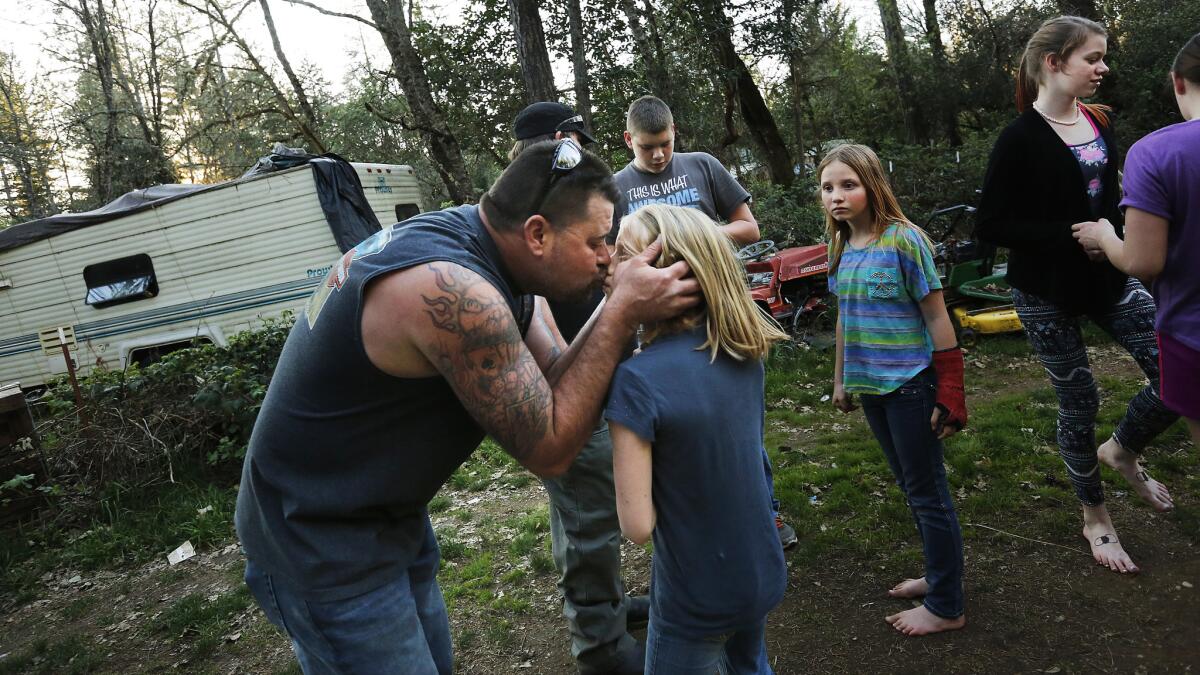
Keven Jones greets daughter Emilee upon his return home from a trip to town.
Then a series of environmental lawsuits in the 1980s and early 1990s brought new federal restrictions on logging from public lands. To keep timber-dependent counties afloat, the federal government offered money to replace the taxes they lost, until they could develop new industries.
But the payments have dwindled and are scheduled to expire next year. People here are waiting to hear whether Washington will provide job training to laid-off timber workers via the federal Trade Act. If the money is approved, Jones hopes he can send Carol to nursing school; sheâd earn four times what he was making at the mill. If the federal money comes through, town leaders keep saying, Cave Junction just might make it.
Jones roams his house, restless, doing laundry and the dishes, trying and failing to avoid thinking about the Trade Act money. Once again, Jones finds himself at the mercy of the government.
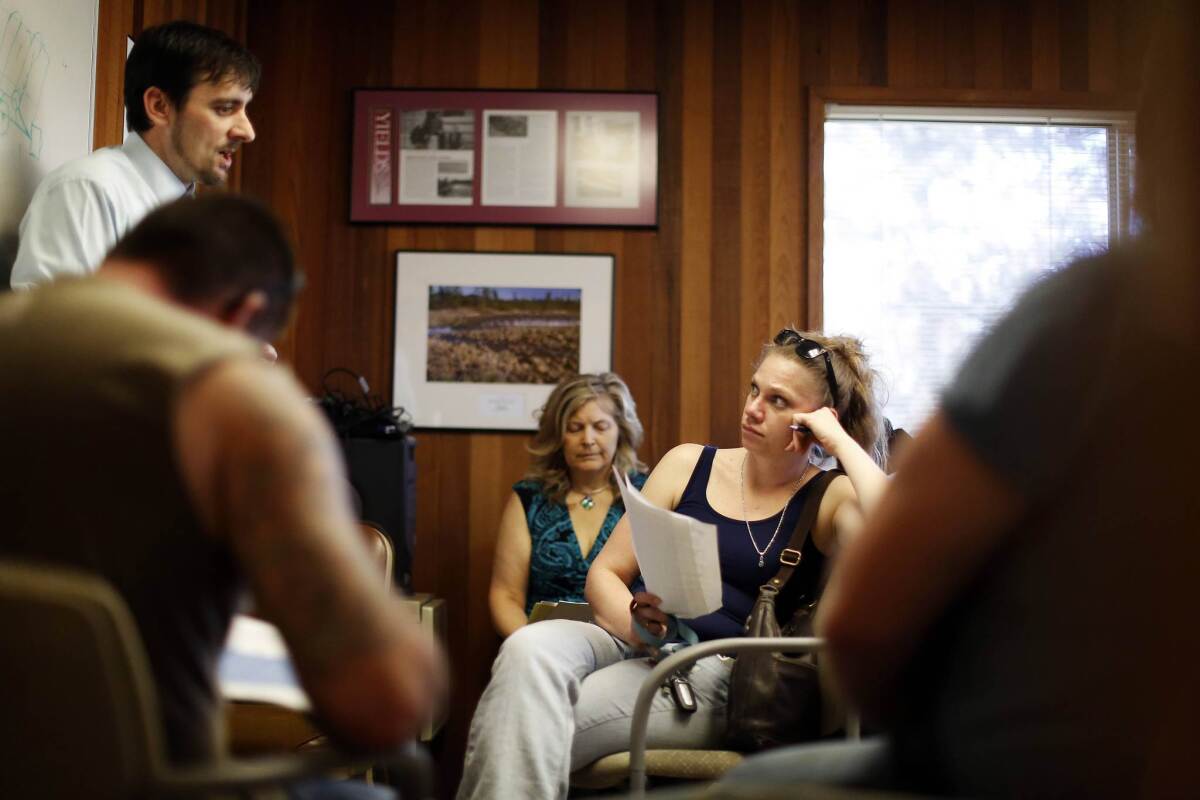
Carol Jones learns about health coverage options while her husband, a saw filer, is on unemployment.
Needing something from the government is the last place Jones wants to be in. He doesnât trust Obamacare, so he and his family have gone without health insurance since the mill closed. He doesnât believe the state has the right to require vehicle insurance, so he has been cited multiple times for driving uninsured.
Still, it was the federal government most people turned to the last time the mill closed, eight hours into a nine-hour shift in 2013. That time, 85 people were out of a job. Two committed suicide.
Trade Act money helped Jones start classes to earn a commercial truck driverâs license. Then the mill owners came back with a promise: The mill was reopening, and if he dropped the truck driver training and came back to work, they would guarantee him five years of employment. âSo I dropped it,â Jones recalls.
The mill didnât make it to a second anniversary, much less five years.
***
Carol Jones crunches to a halt in the parking lot of Rogue Community College under the lazy drifting petals of a just-blooming lavender dogwood. She looks into the back seat, where two 10-year-old girls sit, her daughter Emilee and her niece, Alicia.
The family adopted Alicia seven years ago when Carolâs brother, driving drunk, had a crash that killed his other child. His wife ended up in a mental asylum. Alicia moved in while her father was in prison.
âI already know all the bad words,â Alicia begins. âFart, booger ââ
Carol leads the two girls like a pair of chittering ducklings across the campus, silent and abandoned during spring break. Coming back to school for Carol is a calculated investment. College costs $500 a semester, plus $400 for books and the gas it will take to drive 40 minutes each way to school from Cave Junction. Keven is getting $470 every two weeks in unemployment, and the math is giving her a dull ache behind her eyes.
She leads the kids through the double doors of a low-slung stone building with a sign that reads âADMINISTRATION.â Inside, they settle into a narrow waiting room.
She shifts in her seat and runs more numbers in her head: The college opened at 10 a.m. and the woman on the phone told her she would need to wait at least 20 minutes for an academic counselor, but Carol has to get Alicia to a doctorâs appointment for a broken pinkie at 11. If the wait drags on, sheâll have to reschedule the doctorâs appointment and drive the 28 miles twice. That takes at least four gallons of gas, which will cost $8 more than she has this week.
Carol is worried that the Trade Act money wonât come through, but she also worries what happens if it does. She will have to upend her life again, switching her job as a pharmacy technician to part time, juggling the schedules of four children and her schoolwork.
Twenty minutes pass, then forty. No one emerges from the counseling office.
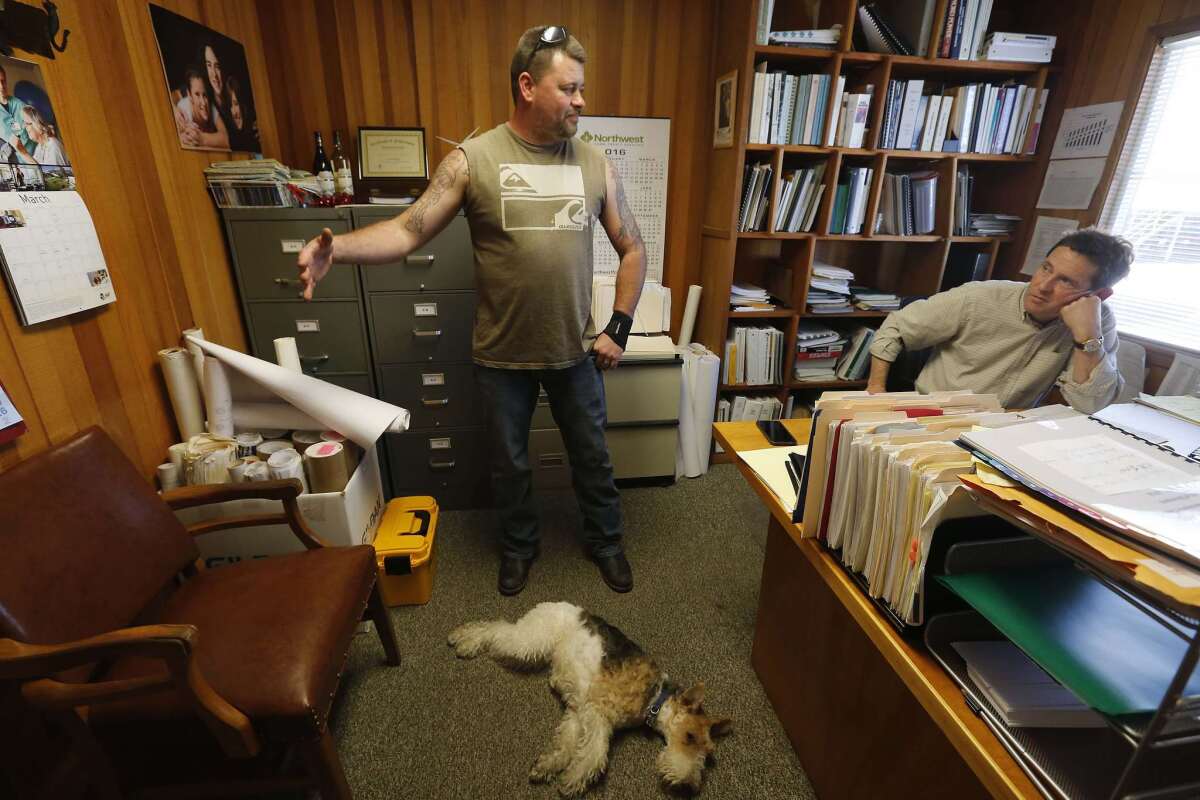
Keven Jones talks with his former boss, mill owner Linc Phillippi, a month after being let go.
A slumped young man in a gray hoodie skulks through the double doors and collapses into a chair across the room. His iPhone lights up and plays the brief, loud sound of what seems like a political speech as he scrambles to silence it. Carol fixes him with a stare, then looks down.
âI already know all the bad words,â Alicia continues. âFart, booger and Donald Trump.â
Carol giggles despite herself. Her husbandâs choice of a New York billionaire to be president still confuses her. But everybody seems to be talking about Trump these days â now her kids are too.
âWhere did you hear that?â she asks.
Carol checks her phoneâs clock again. 10:50 a.m., just 10 minutes to get to Aliciaâs doctor. She stands and stretches and tells the girls to follow her. Community college, Trade Act money, all of it will have to wait another day.
***
The timber payments are nearly over, but money for most public services ran out long ago anyway. Candy wrappers and dirty yellow earplugs drift in lonely puddles outside the silent mill.
The Cave Junction public library is only open for three half-days each week. The sheriffâs office answers the phone weekdays until 5 p.m., then hands off to the lone Oregon State Police trooper who patrols hundreds of miles of interstate.

Keven Jones, left, takes a shot of whiskey with brother Dave Frokemke at Sportsman Tavern.
The town pays a police officer from nearby Grants Pass to patrol on weekdays, but residents complain he only sits in his car, âeyeballing us from behind his window,â as one man puts it, waiting to ticket them for speeding.
A small group of volunteers have taken it upon themselves to patrol Cave Junction. Most nights, theyâre the only semblance of law enforcement. But Josephine County Sheriff Dave Daniels worries when they try to take things into their own hands, confronting suspected meth dealers and burglary suspects. âSomeoneâs going to get hurt,â Daniels said.
In March, a $4,000 radio went missing from a Rogue River Fire Department fire engine, and an anonymous caller said the radio might be returned âfor the right amount of money.â The fire chief said he wasnât going to respond to extortion.
With the unemployment rate now exceeding 7.2% in Josephine County, the biggest issue in this yearâs election here is who can put people back to work. Many are betting itâs the businessman in the race, even if heâs a brash real estate mogul from New York whose chief previous contact with lumber was the veneered reception desks in his swank hotels.
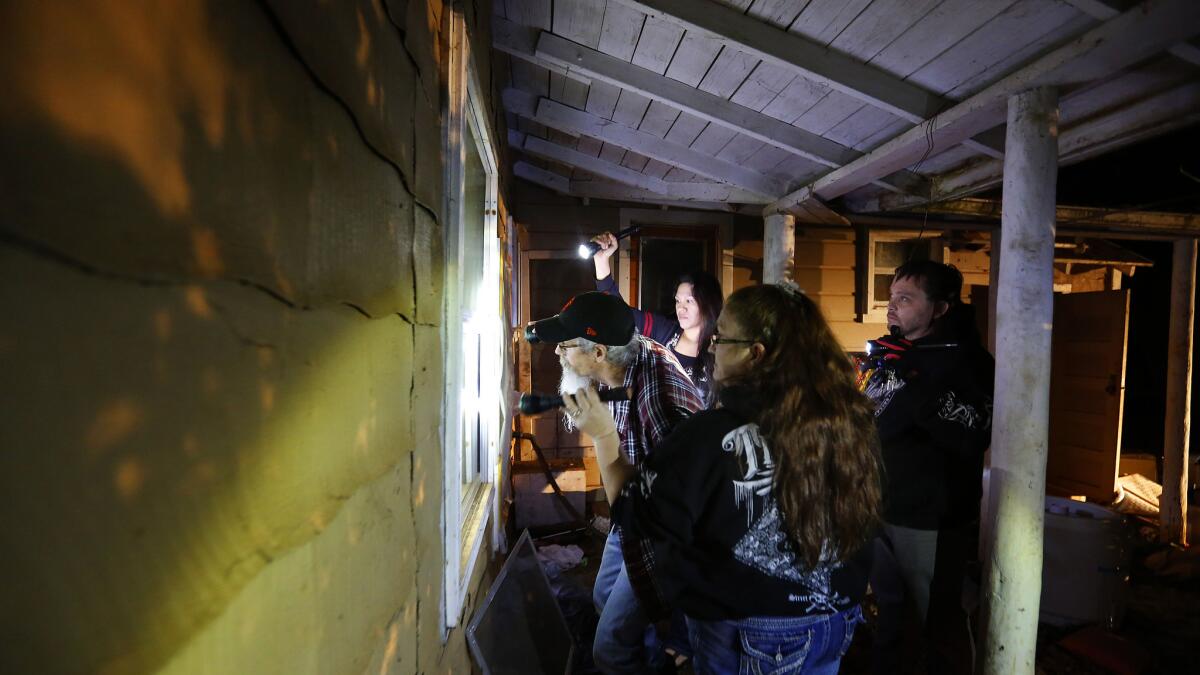
Cave Junction residents on volunteer patrol check an abandoned home where meth users have taken up residence.
Southwest Oregon is not a natural fit for a billionaire East Coaster, but neither are any of the other GOP candidates, particularly those running on a religious platform; Oregon is among the nationâs least church-going states.
Trumpâs conviction that global trade deals are selling Americans short plays well with the independent streak that runs through Oregon Republican politics. Trump, many here believe, would never put up with letting the Western timber industry falter to protect endangered birds and owls.
âItâs a part of the world that sees itself as having been abandoned,â said Jim Moore, a political scientist at Pacific University outside Portland. âThese were not Mitt Romney people; they did not vote for George W. Bush. Theyâve latched on to Trump as they have latched on to other outside candidates. The difference is, heâs winning.â
***
What is left of the Rough & Ready workforce gathers slowly in a tiny meeting room at the mill on a sunny spring afternoon.
A couple of teenagers in sweatshirts thumb through their phones. A gray-haired health insurance agent stands in front next to a whiteboard, handing out packets titled âWhat am I likely eligible for?â
Carol arrives two minutes before 3 p.m. and takes a seat near the front. She traces her finger over the front page of the packet, which lists monetary amounts for public assistance programs, including health insurance, based on family size.
A representative of Rogue Workforce Development, the local unemployment office, tells the assembled workers not to wait for the Trade Act or think of it as their only hope.
âDonât hesitate,â he says. âIf you see something in another sector, take it.â
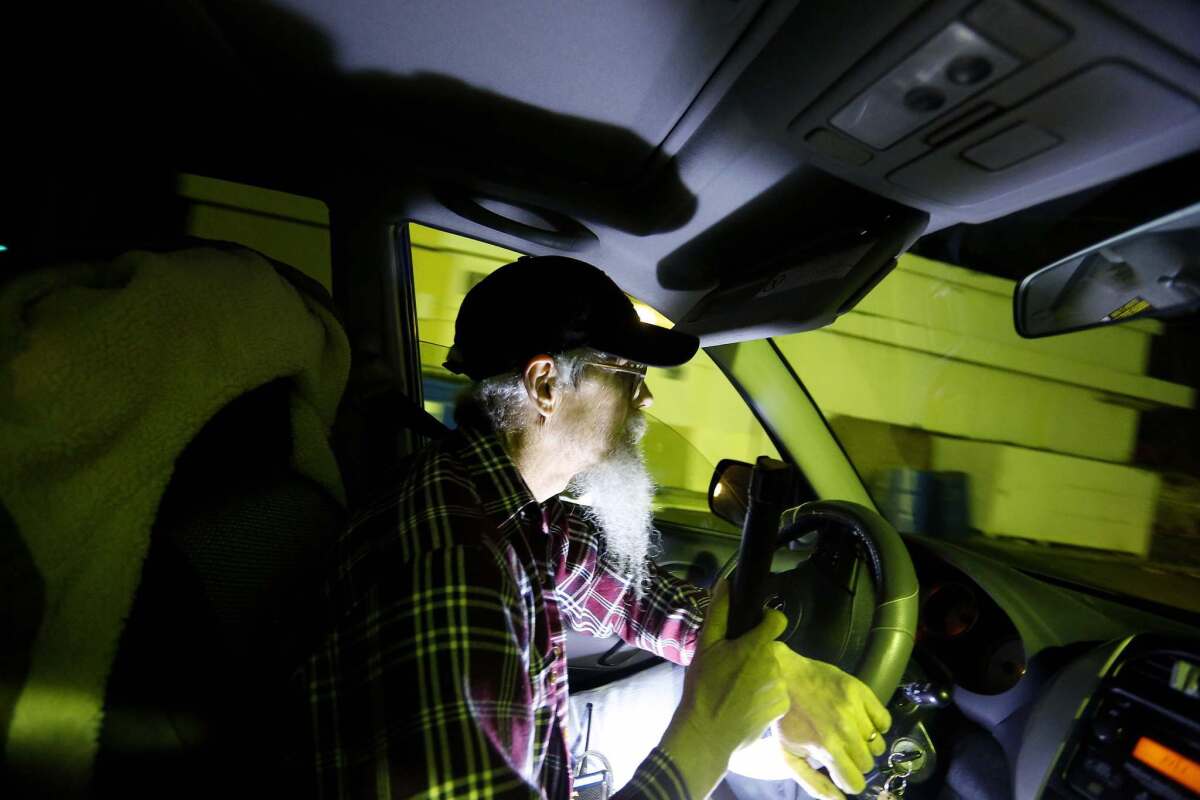
Jimmy Evans patrols a neighborhood in Cave Junction, which canât afford its own police force.
But the jobs they are qualified for, without new training, are few. Mill employees are a specialized workforce, Kevenâs brother Dave Frokemke explains. They are masters of the craft of âturning logs into boards.â After that, someone else has to âmake the boards into stuff.â
As a saw filer, Keven was trained to keep the band saws sized to an exact standard; done incorrectly, it could cost other men their lives. But who needs this now?
The two brothers have come ambling into the meeting room 10 minutes late, grinning, in cut-off T-shirts. Keven shakes hands with the millâs owners, Jennifer and Linc Phillippi, and lowers himself into a seat near the whiteboard.
The insurance presentation drones on. Carol is carefully taking notes. Keven spies a small pile of Ghirardelli chocolates, picks off two and begins loudly unwrapping them. The teenagers at the back of the room smirk.
Insurance agent Mary Reynolds tells them about health insurance options, including the pricey insurance available under the Consolidated Omnibus Budget Reconciliation Act, or COBRA, offered to workers who have lost or changed jobs.
Finally, itâs time for questions. Keven raises his meaty, maimed right hand.
âHowâs anybody supposed to pay for COBRA?â he asks.
âWell, itâs just the first option,â Reynolds replies.
Jones stands.
He tells the room, in three well-chosen words, what he thinks of their offers of help. Dave rises too. They walk out together, followed by the teenagers in the back. Five middle-aged former millworkers exchange uneasy glances. Carol ignores the commotion and continues taking notes.
âYou guys are missing the point about help,â Reynolds calls after them.
âHealth insurance people are full of ...,â Jones shouts back as he makes his way down the hallway.
Several seconds of silence ensue. Then the five middle-aged millworkers stand up and leave.
Follow Nigel Duara on Twitter.
See more of our top stories on Facebook >>
MORE POLITICAL COVERAGE
Rising confidence in Californiaâs economy is a challenge for GOP presidential candidates
Skelton: When it comes to paying taxes, California is Bernie Sandersâ kind of state
Obama drops the mic at his last White House Correspondentsâ Dinner as president
More to Read
Sign up for Essential California
The most important California stories and recommendations in your inbox every morning.
You may occasionally receive promotional content from the Los Angeles Times.
